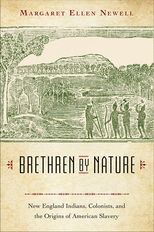 Brethren by Nature: New England Indians, Colonists, and the Origins of American Slavery
Brethren by Nature: New England Indians, Colonists, and the Origins of American Slavery
Contents
-
-
-
-
-
-
-
-
-
-
-
Questioning a Hybrid Society Questioning a Hybrid Society
-
Regulating Indian Slavery Regulating Indian Slavery
-
Creating a Master Class Creating a Master Class
-
New England Indians in Diaspora New England Indians in Diaspora
-
-
-
-
-
-
7 “As good if not better then the Moorish Slaves”: Law, Slavery, and the Second Native Diaspora
Get access-
Published:May 2015
Cite
Abstract
This chapter discusses the changes wrought by King Philip's War (1675–76) in law and practice regarding involuntary servitude. Of the more than two thousand Indians reduced to servitude and slavery as captives during the war, the colonists exported approximately one-fourth into the hungry maw of global slave markets throughout the Atlantic, the Caribbean, the Mediterranean, and the Indian Ocean. The rest remained within New England households to work, as auctions distributed them to households all over the region. The war also cemented English sovereignty in southern New England. In the 1650s and 1660s colonial governments in southern New England had asserted sovereignty over the native inhabitants but had not been fully able to enforce these claims. Now, through conquest and treaty, the colonial governments had come to view all the Indians as subject peoples answerable to English courts and laws.
Sign in
Personal account
- Sign in with email/username & password
- Get email alerts
- Save searches
- Purchase content
- Activate your purchase/trial code
- Add your ORCID iD
Purchase
Our books are available by subscription or purchase to libraries and institutions.
Purchasing information| Month: | Total Views: |
|---|---|
| October 2023 | 2 |
| April 2024 | 2 |
| June 2024 | 1 |
| August 2024 | 2 |
| September 2024 | 2 |
| October 2024 | 1 |



Get help with access
Institutional access
Access to content on Oxford Academic is often provided through institutional subscriptions and purchases. If you are a member of an institution with an active account, you may be able to access content in one of the following ways:
IP based access
Typically, access is provided across an institutional network to a range of IP addresses. This authentication occurs automatically, and it is not possible to sign out of an IP authenticated account.
Sign in through your institution
Choose this option to get remote access when outside your institution. Shibboleth/Open Athens technology is used to provide single sign-on between your institution’s website and Oxford Academic.
If your institution is not listed or you cannot sign in to your institution’s website, please contact your librarian or administrator.
Sign in with a library card
Enter your library card number to sign in. If you cannot sign in, please contact your librarian.
Society Members
Society member access to a journal is achieved in one of the following ways:
Sign in through society site
Many societies offer single sign-on between the society website and Oxford Academic. If you see ‘Sign in through society site’ in the sign in pane within a journal:
If you do not have a society account or have forgotten your username or password, please contact your society.
Sign in using a personal account
Some societies use Oxford Academic personal accounts to provide access to their members. See below.
Personal account
A personal account can be used to get email alerts, save searches, purchase content, and activate subscriptions.
Some societies use Oxford Academic personal accounts to provide access to their members.
Viewing your signed in accounts
Click the account icon in the top right to:
Signed in but can't access content
Oxford Academic is home to a wide variety of products. The institutional subscription may not cover the content that you are trying to access. If you believe you should have access to that content, please contact your librarian.
Institutional account management
For librarians and administrators, your personal account also provides access to institutional account management. Here you will find options to view and activate subscriptions, manage institutional settings and access options, access usage statistics, and more.